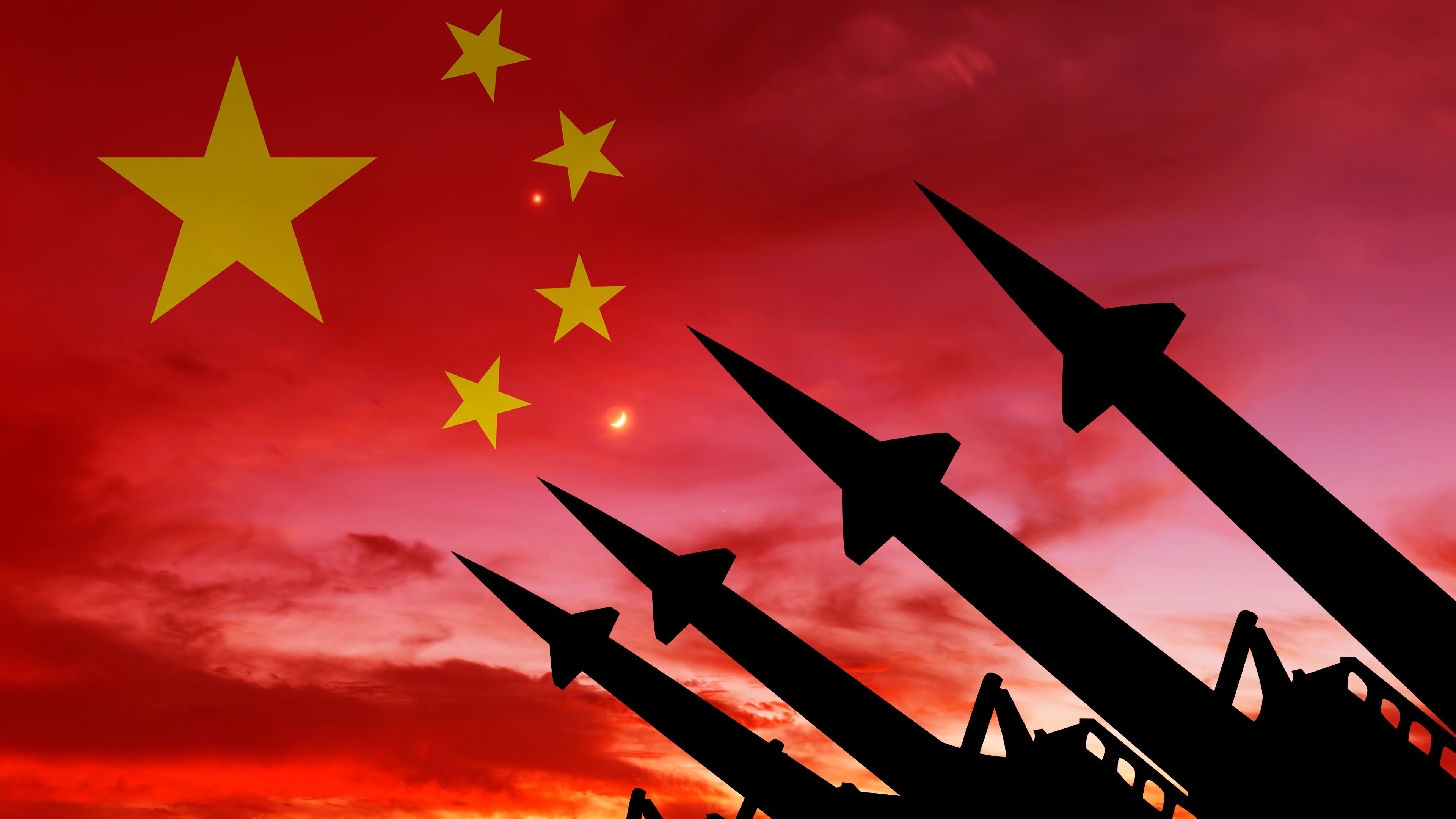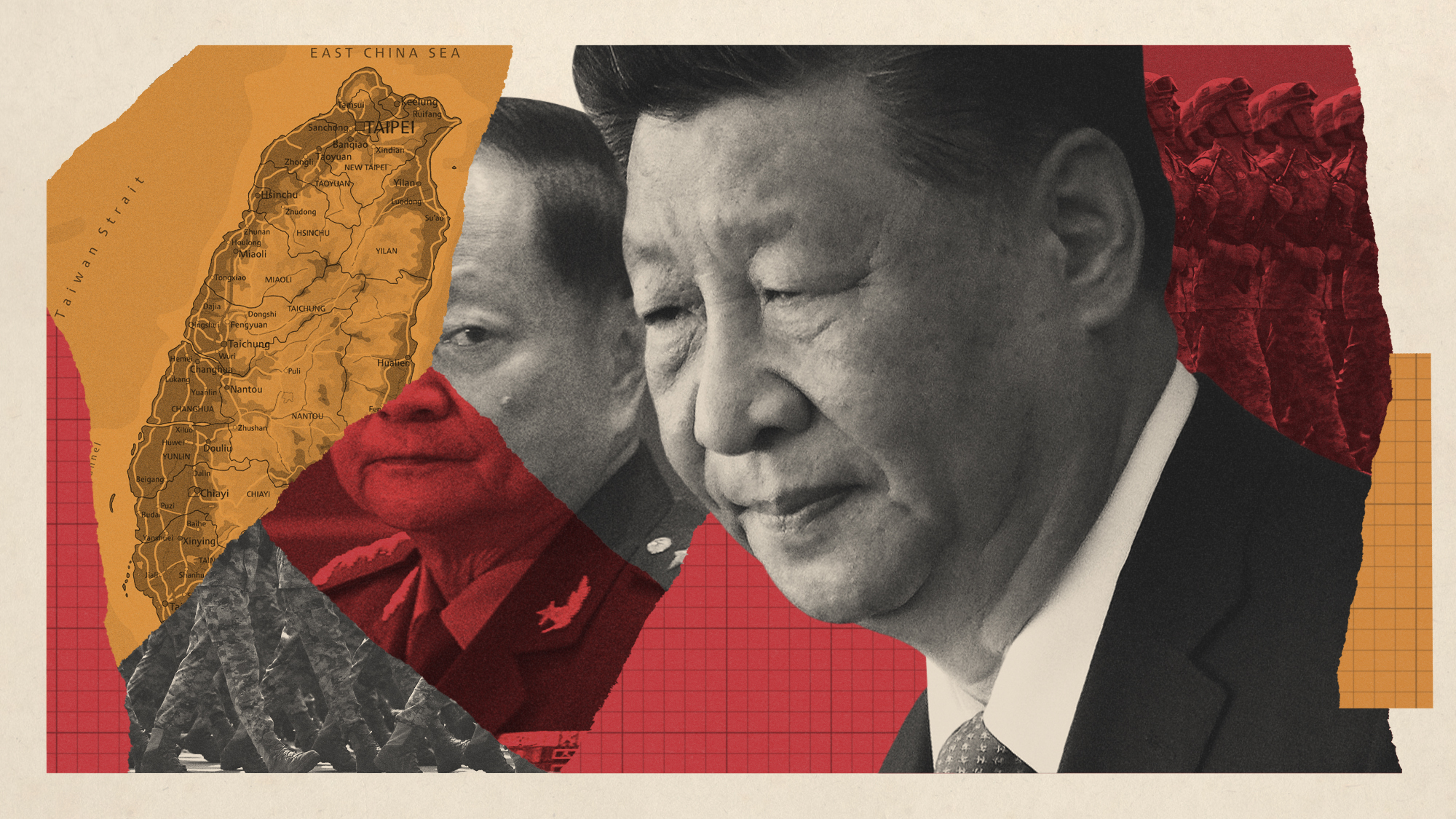As economy falters, China girds its defenses
Leaders want to grow the military faster than the economy


A free daily email with the biggest news stories of the day – and the best features from TheWeek.com
You are now subscribed
Your newsletter sign-up was successful
China is boosting its defense budget. It is ratcheting up its rhetoric against Taiwan. And also: It is trying to get its economy growing again. The country will boost its military spending by 7.2% this year, Reuters said, "fueling a military budget that has more than doubled under President Xi Jinping's 11 years in office." The announcement came at the National People's Congress, a "rubber-stamp parliament" that also officially adopted new language that drops any mention of "peaceful reunification" with Taiwan. All of this comes amid an entrenched economic slump: The rise in defense spending "comes in well above the government's economic growth forecast for this year," which has been targeted at 5%.
"Few things — not even a budget deficit of 3% of gross domestic product — will stand in the way of Beijing increasing defense spending," said the Financial Times. China's military budget has more than doubled under President Xi Jinping (though it still trails American defense spending) and that increase has been "matched by a growing number of regional disputes." But Xi has pledged to give his country a "world-class force" by 2027, and that means the military will "grow regardless of the economic health of China."
That health is shaky, CNN said. China's economy has been battered by a "troubled property sector, deflationary pressures, an exodus of foreign capital, a battered stock market and a record low birth rate." Hitting the 5% target, said one expert, is "ambitious but achievable."
The Week
Escape your echo chamber. Get the facts behind the news, plus analysis from multiple perspectives.

Sign up for The Week's Free Newsletters
From our morning news briefing to a weekly Good News Newsletter, get the best of The Week delivered directly to your inbox.
From our morning news briefing to a weekly Good News Newsletter, get the best of The Week delivered directly to your inbox.
'Gearing up for war'
The continued military spending — along with the change of rhetoric — suggests that Beijing is "gearing up for war," said Business Insider. China hasn't always used the word "peaceful" to describe its goal of reunification with Taiwan, but it's clear the country's leaders are now intent on "taking a tougher approach" to the island. The defense budget shows that leadership "wants to grow its military to the point where it is prepared to win a war if it has no choice but to fight one," said Li Mingjiang, a defense scholar at the S. Rajaratnam School of International Studies, to Reuters.
Other observers are playing down the increase, saying it reflects a focus on "military readiness, not imminent war," said the South China Morning Post. "The cost of high-tech equipment is rising and the increase in military spending is normal to adapt to the advancements in military equipment," said a "former equipment expert" for the People's Liberation Army. That doesn't mean war is on the horizon. "The current situations in the Taiwan Strait and South China Sea are controllable and preventable," said Yue Gang, a retired PLA colonel.
"Alarms should be ringing" in Taiwan and the United States, defense analyst Ben Lewis said in The New York Times. China's military has ratcheted up provocative air and naval activity around Taiwan in recent years, raising the "risk of an accidental confrontation." Increased military spending only makes that confrontation more likely, Michael Beckley and Hal Brands said at Foreign Policy. "One reason China has become more combative is because it can."
No 'policy bazooka'
Sustaining that increased spending on the armed forces will be a lot easier, though, if the Chinese economy grows along with it. That's not a sure thing. While officials have set that "ambitious" economic growth target of 5%, they offered no "showstopping moves" to get there, The New York Times said. "Anybody who is looking for the policy bazooka is going to be disappointed," said Andrew Polk, the co-founder of Trivium China. The focus, it seems, is on actual bazookas.
A free daily email with the biggest news stories of the day – and the best features from TheWeek.com
That's because Xi is giving "priority to strategic autonomy over economic growth," said The Wall Street Journal. Building the military is more important than building the economy. Why? It's all about power. "Xi clearly believes that a stringent focus on security can fend off any threats to his power stemming from China's current economic challenges," said Craig Singleton, the senior director of the China Program at the Foundation for Defense of Democracies. The next year could determine if Xi is right.
Joel Mathis is a writer with 30 years of newspaper and online journalism experience. His work also regularly appears in National Geographic and The Kansas City Star. His awards include best online commentary at the Online News Association and (twice) at the City and Regional Magazine Association.
-
 Political cartoons for February 20
Political cartoons for February 20Cartoons Friday’s political cartoons include just the ice, winter games, and more
-
 Sepsis ‘breakthrough’: the world’s first targeted treatment?
Sepsis ‘breakthrough’: the world’s first targeted treatment?The Explainer New drug could reverse effects of sepsis, rather than trying to treat infection with antibiotics
-
 James Van Der Beek obituary: fresh-faced Dawson’s Creek star
James Van Der Beek obituary: fresh-faced Dawson’s Creek starIn The Spotlight Van Der Beek fronted one of the most successful teen dramas of the 90s – but his Dawson fame proved a double-edged sword
-
 The UK expands its Hong Kong visa scheme
The UK expands its Hong Kong visa schemeThe Explainer Around 26,000 additional arrivals expected in the UK as government widens eligibility in response to crackdown on rights in former colony
-
 ‘Hong Kong is stable because it has been muzzled’
‘Hong Kong is stable because it has been muzzled’Instant Opinion Opinion, comment and editorials of the day
-
 Big-time money squabbles: the conflict over California’s proposed billionaire tax
Big-time money squabbles: the conflict over California’s proposed billionaire taxTalking Points Californians worth more than $1.1 billion would pay a one-time 5% tax
-
 What do Xi’s military purges mean for Taiwan?
What do Xi’s military purges mean for Taiwan?Today’s Big Question Analysts say China’s leader is still focused on reunification
-
 Gabbard faces questions on vote raid, secret complaint
Gabbard faces questions on vote raid, secret complaintSpeed Read This comes as Trump has pushed Republicans to ‘take over’ voting
-
 Did Alex Pretti’s killing open a GOP rift on guns?
Did Alex Pretti’s killing open a GOP rift on guns?Talking Points Second Amendment groups push back on the White House narrative
-
 What is at stake for Starmer in China?
What is at stake for Starmer in China?Today’s Big Question The British PM will have to ‘play it tough’ to achieve ‘substantive’ outcomes, while China looks to draw Britain away from US influence
-
 ‘It’s good for the animals, their humans — and the veterinarians themselves’
‘It’s good for the animals, their humans — and the veterinarians themselves’Instant Opinion Opinion, comment and editorials of the day
